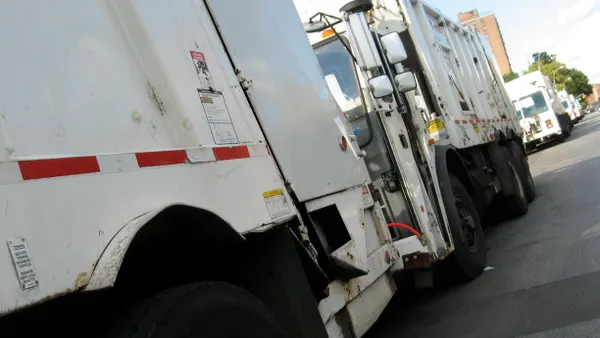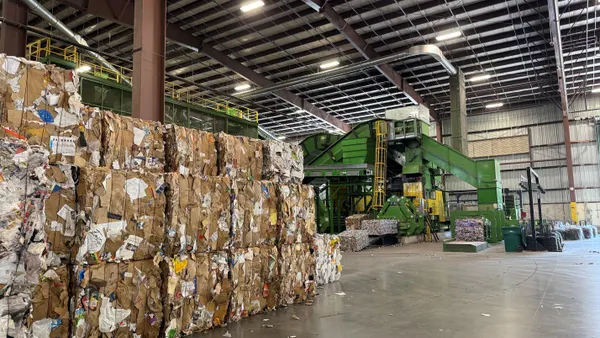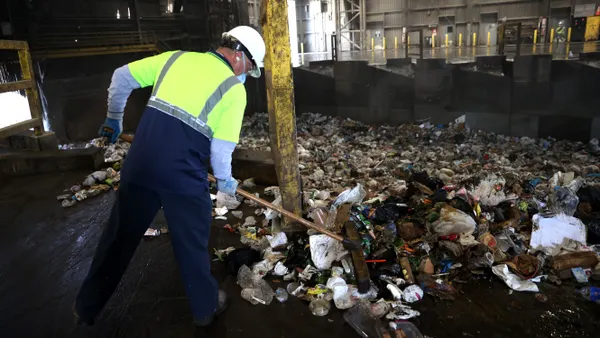Dive Brief:
- The Los Angeles Board of Public Works approved on Monday the release of LA Sanitation & Environment’s request for proposals to update its RecycLA commercial waste franchise system. This comes after contract amendment talks with haulers stalled early last year.
- Eight-year contracts secured through the RFP would begin in February 2027, with an automatic two-year renewal if service providers meet landfill tonnage reduction requirements during calendar year 2032. LASAN may also grant two additional five-year extensions.
- LASAN proposed many changes in the RFP, such as eliminating fees for container access, distance, weight and fullness levels. It will also require that organics service be included as part of the maximum base rate to comply with California’s SB 1383 requirements.
Dive Insight:
RecycLA reshaped the city’s commercial waste market in 2017 by awarding exclusive contracts to seven haulers across 11 zones with numerous policy requirements. This latest RFP could further accelerate that shift by implementing various “lessons learned” since the program’s launch.
Previously, the city had an estimated 140 permitted haulers servicing commercial accounts in an open market system. Reform proponents raised concerns about worker safety, service quality, cost, recycling rates and vehicle emissions, leading to the establishment of RecycLA.
"Many of these program goals were achieved. Unfortunately some of them were only partially achieved and some of them not achieved at all,” said Dan Meyers, LASAN’s division manager for the program, during the Sept. 15 meeting.
LASAN says converting to an exclusive system yielded guaranteed customer access to blue bin recycling, higher labor standards, a citywide conversion to compressed natural gas vehicles, an estimated $175 million in facility investments and more.
Following an acquisition, the program now has six haulers — Athens Services, WM, Republic Services, Ware Disposal, Nasa Services and Universal Waste Systems. It covers approximately 66,385 customers, including businesses and multifamily buildings with five or more units. Customers generated nearly 1.6 million tons of waste in 2024, with under 19% of that ending up in blue or green bins.
Meyers said none of the RecycLA service providers have met contractually required landfill volume reduction targets in all of their zones so far.
Officials say the program’s treatment of green bin organics service as optional has hindered diversion and also runs afoul of a state law that passed after the zone system began. An estimated 60% of RecycLA customers don’t have organics service for various reasons.
"The city itself is in noncompliance with SB 1383, making the city subject to fines or penalties from CalRecycle,” said Meyers.
So far the state agency has avoided fining the city as it works out these issues.
The RFP also calls for haulers to partner with community composters, which drew support from LA Compost at the Monday meeting. It also expects haulers to keep funding edible food recovery efforts, which so far have saved the equivalent of 44 million meals.
LASAN believes it can further boost diversion rates by taking over responsibility for citywide outreach and education, letting the haulers focus more on engaging with customers about contamination reduction. Additionally, the RFP requests “innovative ideas” to reduce disposal volumes.
The agency is also taking a more flexible approach on zero-emission vehicles. The California Air Resources Board is no longer requiring them due to the Trump administration’s opposition. Now, LASAN will ask proposers to submit two cost estimates — one for zero-emissions vehicles, such as electric trucks, and one without.
Cost is a frequent theme in the RFP and will account for 40% of bid scores. The city plans to index annual cost increases to the consumer price index, with a 5% cap. Meyers said this was informed by research from consultants Jacobs Engineering and HF&H about comparable services in Los Angeles County. RecycLA’s service costs came out slightly above average versus other municipalities.
LASAN said one way to reduce costs will be to eliminate various unpopular fees related to bin management. According to Meyers, thousands of customers were collectively charged $60 million in access and distance fees on their black bins last year. In some cases this doubled or tripled their rates.
The city did reach a contract amendment with haulers in 2019 to offset fees on blue bins, by offering to pay 50%, but those costs are starting to add up. This cost an estimated $23 million out of the city’s general fund last year and is considered “not fiscally sustainable.”
The RFP also makes a host of other changes related to how long bins can be left outside, liquidated damages and other technical requirements.
LASAN will preserve three of the 11 zones for smaller haulers, which can’t be bundled with larger zone contracts. No hauler will be awarded more than 49% of all customers.
The city also has a new angle that it thinks could increase competition. The RFP requires haulers to subcontract scout services, which is a change from the current program.
“We were asked by council members, ‘how come this massive $750 million contract [does] not have more small business opportunities?’” said LASAN Director Barbara Romero, estimating scout services could be worth $25 million to $30 million. “We included this to allow more people to participate in this endeavor.”
One key RecycLA backer opposed the move.
“These are often low-wage, less trained subcontractors with little oversight. Increasing their role risks service quality, public safety and the dignity of stable jobs that families rely on,” said Adan Alvarez, communications director for Teamsters Local 396, at the meeting.
LASAN staff said they anticipate haulers from other cities, who already have scout services to monitor their own work, might apply.
The RFP is available on the city’s Regional Alliance Marketplace for Procurement portal. A preproposal meeting is scheduled for Oct. 7 and bids are due Nov. 17.
Editor’s note: This story has been updated to include the official bid documents and details on the submission process.












